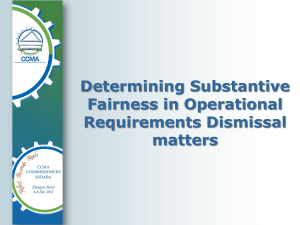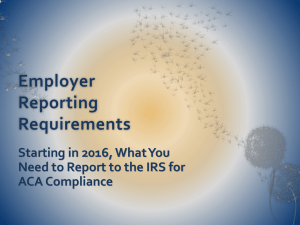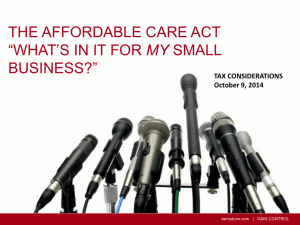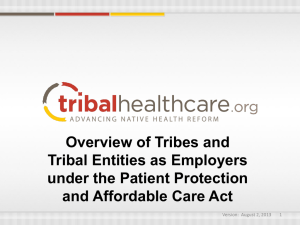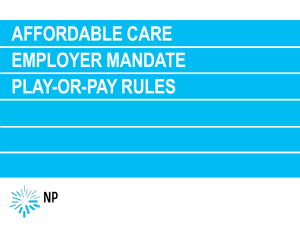Reporting and Compliance Mandates for ALL Employers within the
advertisement
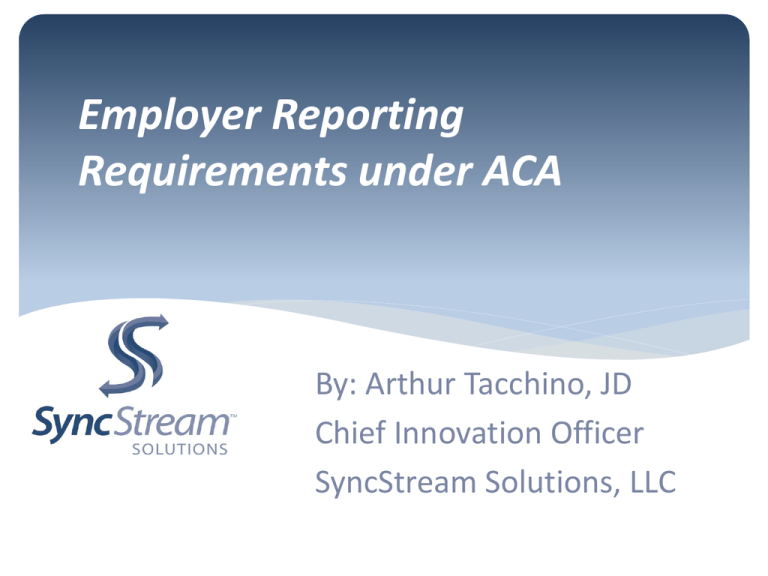
Employer Reporting Requirements under ACA By: Arthur Tacchino, JD Chief Innovation Officer SyncStream Solutions, LLC Reporting Requirements • Code §6056 – Applicable Large Employer and Offering Employer Reporting • Code §6055 – Reporting for Employers that Self-Insure • W-2 Reporting § 6056 Reporting • Effective beginning in 2015 – Delayed 1 Year – • Early voluntary compliance is acceptable “Applicable Large Employers” must report, whether they offer coverage or not – An employer that employed 50 or more full-time equivalent employees in the preceding year – Controlled group rules apply for determining A.L.E. Status* A.L.E. Status • Each Month throughout 2014: – Identify full-time employees – Aggregate hours of service by anyone not full-time – Divide aggregate hours of service by 120 – Add the number of full-time employees to the number of equivalent employees to determine the average number of full-time equivalent employees the employer employed that month • January 2014 Example – 45 full-time employees – 15 part-timers that worked 1,200 hours throughout the month – 1,200 aggregate hours / 120 = 10 equivalent employees – 10 equivalent employees + 45 Full-time employees = 55 Full-Time Equivalent Employees When does employer report? • The actual report will be much like W-2 reporting • By January 31st of the following year • Practically speaking the report would be delivered in January of 2016 with 2015 plan information What does employer report? • the employer’s name, date, and employer identification number (EIN); • a certification of whether the employer offers its full-time employees and their dependents the opportunity to enroll in “minimum essential coverage” under an eligible employer-sponsored plan • the number of full-time employees the employer has for each month during the calendar year; • the name, address, and taxpayer identification number (TIN) of each full-time employee employed by the employer during the calendar year and the months (if any) during which the employee and any dependents were covered under a health benefit plan sponsored by the employer during the calendar year; and • any other information required by the IRS The statute also requires that employers that offer the opportunity to enroll in “minimum essential coverage” • must also report the months during the calendar year for which coverage under the plan was available; • the monthly premium for the lowest-cost option in each of the enrollment categories under the • plan; • the employer’s share of the total allowed costs of benefits provided under the plan; and • in the case of an employer that is an applicable large employer, the length of any waiting period with respect to such coverage Who gets a report? • The employer is responsible to furnish a report for the IRS, as well as a statement to their full-time employees which includes: – the name, address, and contact information of the reporting employer; and – the information required to be shown on the return with respect to the individual • *Currently the IRS is trying to “simplify” reporting Penalties for Noncompliance • Employer becomes subject to penalties for failure to file an information return and failure to furnish payee statements • Employer shall pay a penalty of $100 for each statement with respect to which such a failure occurs, but the total amount imposed on such employer for all such failures during any calendar year shall not exceed $1,500,000 § 6055 Reporting • Effective beginning in 2015 – Delayed 1 Year – • Early voluntary compliance is acceptable Code § 6055 requires insurers, sponsors of self-insured plans, and other entities that provide minimum essential coverage to an individual during a calendar year to comply with this reporting requirement When does employer report? • The actual report will be much like W-2 reporting • By January 31st of the following year • Practically speaking the report would be delivered in January of 2016 with 2015 plan information What does employer report? • the name, address, and taxpayer identification number (TIN) of the primary insured,65 and the name and TIN of each other individual obtaining coverage under the policy; • the dates during which the individual was covered during the calendar year; • if the coverage is health insurance coverage, whether the coverage is a qualified health plan (QHP) offered through a health benefit Exchange; • if the coverage is health insurance coverage and that coverage is a QHP, the amount of any advance cost-sharing reduction payment or of any premium tax credit with respect to such coverage; and • any other information required by the IRS In addition, under the statute, if health insurance coverage is through an employer-provided group • health plan, the return must contain the following information: • the name, address, and employer identification number (EIN) of the employer maintaining the plan; • the portion of the premium (if any) required to be paid by the employer; and • any other information the IRS may require to administer the new tax credit for eligible small employers under Code § 45R Who gets a report? • The employer is responsible to furnish a report for the IRS, as well as a statement to their full-time employees which includes: – the name, address, and contact information of the reporting employer; and – the information required to be shown on the return with respect to the individual • *Currently the IRS is trying to “simplify” reporting Penalties for Noncompliance • Employer becomes subject to penalties for failure to file an information return and failure to furnish payee statements • Employer shall pay a penalty of $100 for each statement with respect to which such a failure occurs, but the total amount imposed on such employer for all such failures during any calendar year shall not exceed $1,500,000 Measurement, Administrative, and Stability Periods • These new tracking requirements will dictate, who is “full-time”, therefore, who should be offered coverage • Systems must be put in place W-2 Reporting • Became effective in 2012 • 250 W-2 Exemption still in place • Employers required to report the aggregate cost of employer sponsored coverage on the employee’s W-2 • Still informational only reporting Utilize Resources • ACA Decision Support Tool • ACA Dashboard • Subsidy Determinator • SyncACA Q&A Visit us at www.sync-stream.com Call: 877-291-9256 Email: infoabout@sync-stream.com




